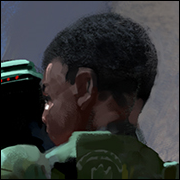|
Violet_Sky posted:Does this subforum have a discord btw? There isn't an official CC discord, no, but one of the biggest writing discussion space is the Thunderdome server. You don't need to do or care about Thunderdome to join! There are plenty of writing discussion spaces for novels, worldbuilding, and critiques. https://discord.gg/GMCB8nCc
|
|
|
|

|
| # ? May 21, 2024 13:59 |
Sitting Here posted:There isn't an official CC discord, no, but one of the biggest writing discussion space is the Thunderdome server. You don't need to do or care about Thunderdome to join! There are plenty of writing discussion spaces for novels, worldbuilding, and critiques. Really? When I joined it a few years back, I got asked to leave because I had no interest in doing Thunderdome. Maybe I'm thinking of a different one. Milkfred E. Moore fucked around with this message at 01:51 on Feb 23, 2023 |
|
|
|
|
Milkfred E. Moore posted:Really? When I joined it a few years back, I got asked to leave because I had no interest in doing Thunderdome. Maybe I'm thinking of a different one. Sounds like that was probably back in the old IRC days! In any case, these days we welcome all goon writers.
|
|
|
|
sebmojo posted:On a brief and extremely unscientific survey ai can write perfectly decent stories at a 12 year old kid level. They're not good, but they're also not conspicuously bad, so if someone put some time into it I can totally see an ai story being publishable. a self-driving car could probably navigate a town with a decent grid layout but it's not winning the Monaco Grand Prix any time soon
|
|
|
|
SurreptitiousMuffin posted:Publishable? Sure. In Clarkesworld though? It has some of the best pay (and also the highest rejection rate) in the genre space. If you write something and go "gently caress, this could win a Hugo", you sub Clarkesworld. Oh for sure, I was just speculating based on the tools only getting better.
|
|
|
Sitting Here posted:Sounds like that was probably back in the old IRC days! In any case, these days we welcome all goon writers. They do indeed. I haven't had anything like the time to revisit my dip into it but it was a really fun and rewarding experience that was just what I was after.
|
|
|
|
|
Sitting Here posted:There isn't an official CC discord, no, but one of the biggest writing discussion space is the Thunderdome server. You don't need to do or care about Thunderdome to join! There are plenty of writing discussion spaces for novels, worldbuilding, and critiques. Not working for me. 
|
|
|
|
Doctor Zero posted:Not working for me. The link may have expired, try this one: https://discord.gg/QpAESdpc
|
|
|
|
curlingiron posted:The link may have expired, try this one: https://discord.gg/QpAESdpc It works! 
|
|
|
|
I'm at an impasse on a creative decision I made in my novel. The bulk of the story is in first person, a very chatty one with the protagonist addressing the reader on occasion. At one point in the story he gets himself incapacitated and the viewpoint shifts to another character while they effect a rescue. That section is in third person. The follow up book uses this character as the protagonist and I was planning on writing it in third person, hence the switch. I was lucky enough to get a few beta readers over the last month. Overall the response is split 50/50 on the viewpoint shift. Half were absolutely fine with it and the other half found it jarring. I'm split. I could keep it as is, adding more to the character development earlier so they "earn" the focus better. I could re-write it in first person, and the subsequent book as well. Or I could remove it entirely and just have the rescue, when it comes, from the protagonist's 1st person viewpoint. 1st to 3rd switches, when I've run across them, are narrative choice I've personally found quite fun. Which is why I gave it a go. Both The Martian and The Bartimaeus Trilogy use that shift well. Thoughts?
|
|
|
|
CaptainCrunch posted:I'm at an impasse on a creative decision I made in my novel. As you point out, 1st to 3rd POV switches are nothing new and aren't necessarily jarring, which means the obvious (though not definitely correct) answer is that you need to do some work, perhaps in beefing up the character development, perhaps in simple signposting (e.g., chapter subtitles indicating POV/whatever -- "[Character A]" vs. "The Chronicles of [Character B]"), or perhaps in just having 3rd POVs start earlier in the book (overlaps with idea about character development, maybe, but the issue might be that all of a sudden, 75% of the way through the book, there's 3rd person POV, while having a few sprinkled in earlier chapters might have fixed that). Can you go back and ask them what they thought was so jarring? Sudden switch far along in book vs. side character suddenly getting spotlight vs. whatever?
|
|
|
|
If half the people don't mind it and *you* like it then I say keep it, at least for now.
|
|
|
|
CaptainCrunch posted:I'm at an impasse on a creative decision I made in my novel. If it’s really voicey first person for the bulk of the novel, I could see it being jarring switching to a less close third. One option would be to keep the protagonist the narrator, who’s retelling what their rescuer did—which would make the switch to third more seamless and maintain the story’s overall voice I’ve seen it done this way in Damon Runyon’s gangster short stories, which are always told by the same narrator. He often spends a lot of time relating the stories other guys tell him. Though in his case, he goes for direct quotation, so it’s also told in first person
|
|
|
|
Everyone should read Damon Runyon, his voice is incredible (fair warning though times were a little different back then)breach of Promise posted:One day a certain party by the name of Judge Goldfobber, who is a lawyer by trade, sends word to me that he wishes me to call on him at his office in lower Broadway, and while ordinarily I do not care for any part of lawyers, it happens that Judge Goldfobber is a friend of mine, so I go to see him.
|
|
|
|
Damon Runyon is as good as Wodehouse or Pratchett. And the voice is infectious.
|
|
|
|
sebmojo posted:Everyone should read Damon Runyon, his voice is incredible (fair warning though times were a little different back then) Hell yeah! I’m bookmarking that even though I got a hefty physical copy This is exactly the kinda thing I’m talking about, and I’m happy to be reminded he does tell them in third person too quote:So these residents of Brooklyn drive in their automobile along this route, and as they roll past Lance McGowan, Angie the Ox and Mockie Max let fly at Lance with a couple of sawed-offs, while The Louse Kid holds the burlap bag, figuring for all I know that Lance will be startled by the sawed-offs and will hop into the bag like a rabbit.
|
|
|
|
On the subject of voice I just started reading Titus Groan and Peake has such an incredible voice. If you told me I'd be totally riveted reading an entire chapter, with fairly elevated language, about a drunken chef almost singing a song, I would have asked you to please get out of my room
|
|
|
|
|
Stuporstar posted:If it’s really voicey first person for the bulk of the novel, I could see it being jarring switching to a less close third. One option would be to keep the protagonist the narrator, who’s retelling what their rescuer did—which would make the switch to third more seamless and maintain the story’s overall voice I was going to say this. Donald Westlake did an awesome switch to third person that I love in “The Fugitive Pigeon”. One chapter towards the end the protagonist says he’s switching to 3rd person because thinking about what happened is still too tense for him so he has tell that part in 3rd person in order to relate it well. If the character is already talking to the reader it would be on point for them to say something like “Of course I was unconscious through what happened next, but I was told later that …”
|
|
|
|
HopperUK posted:If half the people don't mind it and *you* like it then I say keep it, at least for now. (but note that doing it on purpose means committing thoroughly to making sure there's a reason you've done it, more than just "i guess this happened with these other people for a bit")
|
|
|
|
Admiralty Flag posted:Can you go back and ask them what they thought was so jarring? Sudden switch far along in book vs. side character suddenly getting spotlight vs. whatever? Seems that the character to whom I go 3rd person with was developing in a way that was annoying one of the readers and they felt the character hadn't "earned" the spotlight. That's definitely something I can address along with a stronger chapter title to indicate the switch. Wungus posted:This. There's a bunch of folk who are going to get confused or upset or lost if you make any artistic choice in a book, whether it's shifting POVs, tense, or even just cutting a sentence short. Do what you want, and do it on purpose. Thanks, I appreciate the input, especially the Damon Runyon! Not sure which way I'll jump yet, but I'll probably do a couple versions and decide which one I like better from there.
|
|
|
|
If you missed the ProWritingAid online Fantasy Writers' Week conference, you can catch the replays with slides and transcripts here until 10 March: https://prowritingaid.com/fantasy-week/hub Based on the agenda, most of it looks like fairly basic writing advice stuff. For those who were intrigued by the Save the Cat discussion earlier, there's a session from the author of that book. The other sessions jumping out at me are the book marketing one and and the "Write a Fight" one because it's from a guy who is both an author and a Muay Thai coach. Also in other writing craft stuff, I recently finished reading Robert McKee's Dialogue. He broadens the definition of dialogue beyond just "talk between characters" to "any and all words said by a character to herself, to others, or to the reader/audience as an action taken to satisfy a need or desire" which covers...well, virtually all prose. It presented a pretty good framework for thinking about prose at the line level. More helpful for diagnosis than as a suggested approach to writing anything though I did have to give him some serious side eye for unironically writing Robert McKee posted:Dialogue takes work. Compare the effort to bring someone to mind with words ("my cousin Judy") to the task of first conjuring up a glowing image of your cousin—her Alice-blue eyes, and the almost Asian shape they take when she smiles—then holding her living picture before your mind while you rummage through your vocabulary. ...this book was published in 2016. The other unintuitive thing that I'm struggling to wrap my mind around is that he insists third person limited doesn't qualify as dialogue because there is no "character". Like, there's a good 1-2 pages dedicated to explaining his view: Robert McKee posted:In a third-person telling, a narrating intelligence guides the reader through the story's events. This intelligence often has deep insight into the thoughts and feelings of all characters...Yet by convention, it maintains a distance by referring to the cast with the pronouns "her," "he," and "they." Confusing as hell, because if the distinction is that important, then I'd sure like to know what said unique strategies and techniques are, considering how dominant third person limited is in genre fiction. All in all, I'm not really sure how much that distinction matters, it seems kind of like a technical/theoretical point to me, so if anybody's got more insight into this, I'd love to hear it. Leng fucked around with this message at 23:01 on Mar 3, 2023 |
|
|
|
I've read McKee's Story twice and half of it is the stuff Synder repackaged in Save the Cat with a funnier voice and half of it are obtuse diagrams about the story going up while the protagonist goes down that I have zero idea what to do with.
Megazver fucked around with this message at 02:54 on Mar 4, 2023 |
|
|
|
^^ Ok this just makes me think this McKee guy is an idiotLeng posted:If you missed the ProWritingAid online Fantasy Writers' Week conference, you can catch the replays with slides and transcripts here until 10 March: Sounds like an absolute load of horseshit to me (points at Damon Runyon bit I quoted last time as 3rd person acting as a literal extension of 1st). Like how is this bullshit definition of dialogue even useful except to point out, “Oh yeah, don’t forget to make your first person narrator sound like the character.” Like noooo poo poo, you don’t need to come up with a brand new definition of dialogue, muddying the waters of what loving is dialogue, just to point that out And then desperately trying to exclude third person as a totally different kinda narrative when there’s a huge spectrum between distant 3rd and so close it’s practically 1st except for the pronoun change—nah, this definition and advice is a buncha mixed-up brain vomit. Don’t worry about not getting it, because the reason you’re not getting it is because it’s loving nonsense Stuporstar fucked around with this message at 00:47 on Mar 4, 2023 |
|
|
|
Stuporstar posted:Don’t worry about not getting it, because the reason you’re not getting it is because it’s loving nonsense
|
|
|
|
Adaptation brutally skewered McKee and I still rewatch it occasionally, Cox is so good, so smugly Straight Talkin Tell It Like It Is and yet so fantastically empty
|
|
|
|
curlingiron posted:The link may have expired, try this one: https://discord.gg/QpAESdpc Can I get a fresh invite? This one is dead.
|
|
|
|
BigRed0427 posted:Can I get a fresh invite? This one is dead. Yep! Here you go: https://discord.gg/rkr6wjZG
|
|
|
|
curlingiron posted:Yep! Here you go: https://discord.gg/rkr6wjZG Thank you. Just joined
|
|
|
|
We need a new driver. This one is dead.
|
|
|
|
https://www.writerswrite.co.za/9-ways-to-write-with-literary-flair/ While googling for ways to jazz up my prose, I found this article about various literary writing technique, which I thought was worth sharing. It is written tongue-in-cheek, but the techniques are valid, and I really like writing advice that is presented as a toolbox of things you can try rather than rules to be followed.
|
|
|
|
|
SimonChris posted:https://www.writerswrite.co.za/9-ways-to-write-with-literary-flair/ Lol. That’s great. And you really hit the nail on the head. There really are no rules with writing. Every so called ‘rule’ has dozens of examples that break it that work just fine.
|
|
|
|
I like the idea that literary writing is characterized by more postcards and fewer scenes. In a scene the state of the story and characters change, in a postcard what changes is the reader's understanding of a person or place or thing.
|
|
|
|
Most of the literary works I've read only fit the first half of that rule—they change the reader's understanding more, but the state of the story no less. Jane Eyre, The Mill on the Floss, Things Fall Apart—these books are less action-packed than a suspense novel, maybe, but not than fiction writ large. I'm less familiar with 21st-century lit, partially because it's harder to agree on what it is, but what I have read (Bel Canto, some other stuff I'm blanking on) follows the same trend. There's definitely a mode of literary writing that makes heavy use of postcards—The Elegance of the Hedgehog, maybe The Day of the Locust—but I don't think it's the dominant one.
|
|
|
|
Elephant Parade posted:Most of the literary works I've read only fit the first half of that rule—they change the reader's understanding more, but the state of the story no less. Jane Eyre, The Mill on the Floss, Things Fall Apart—these books are less action-packed than a suspense novel, maybe, but not than fiction writ large. I'm less familiar with 21st-century lit, partially because it's harder to agree on what it is, but what I have read (Bel Canto, some other stuff I'm blanking on) follows the same trend. That's a higher ratio of postcards to scenes, which I think is the General's point. quote:There's definitely a mode of literary writing that makes heavy use of postcards—The Elegance of the Hedgehog, maybe The Day of the Locust—but I don't think it's the dominant one. Agreed. Epistolary fiction is definitely less popular than it was.
|
|
|
|
I wasn't clear. I don't think most literary fiction—that I've read, at least—has a particularly large number of postcard-type scenes. In my experience, it provides more thought-provoking characters than genre fiction while still advancing the plot at the usual rate.
|
|
|
|
I was having trouble understanding the distinction since usually the way you learn about a character or setting is through a scene. I think it might be that in genre the scene is expected to advance/change plot/character (people in this very thread repeat something like "every scene must serve the story") whereas its much looser in literary fiction. A character's emotional state is enough, sometimes. Though, again, that state is triggered by something that happened, either in text or in the past. This can only be taken so far and one of the most common pitfalls new literary fiction authors make is writing plotless, ungrounded streams of emotions that extremely few writers can pull off. Honestly, I think the biggest differences between the two "genres" are pacing and language. But we're talking about categories of thousands upon thousands of books here so for every statement you make, you can find dozens of exceptions.
|
|
|
|
Hey guys! I'm looking for a little advice on the topic of synopses. I've written a novel and am working up to sending it out to agents. I've read advice which says I should have a synopsis for my novel that is only the size of one piece of A4. The question is this: my novel is 112,000 words long. What elements of it should be included in a synopsis? Purely plot elements? Plot and key relationships? Thematic elements? I have completed a first pass at a synopsis and it is mostly concerned with plot, and is about a page and a half in length. I'm not sure where to go from here and any wisdom is much appreciated.
|
|
|
|
Easiest way is to post the synopsis if you don't mind doing that, then you'll get a bunch of new eyes on it.
|
|
|
|
Robert Deadford posted:Hey guys! Fellow writer Nae, sent me this link when I was struggling with my synopsis: https://web.archive.org/web/20210902014439/http://www.publishingcrawl.com/2012/04/17/how-to-write-a-1-page-synopsis/ And while it might not work for everything, it's a drat good place to start. I always need a fairly basic breakdown when I'm learning something new, and this helped me understand in a way I could take off from. Also, what sebmojo said,  and let Internet strangers guide you. and let Internet strangers guide you.
|
|
|
|

|
| # ? May 21, 2024 13:59 |
|
Here goes nothing, then. The novel is called Unregistered. It's a crime thriller with lower-powered superheroes as the main characters. This is my first attempt, coming in at a chunky 1107 words. Under spoilers, because it's not a very good synopsis. It is the year 2000. One in a million people worldwide are born with a power of some kind. In Britain, they are known as The Talented, and after one of them committed an atrocity, are considered so dangerous that they are forced to register their identities and Talents with the government. Red Line/Christine is the cynical and violent chief enforcer and lead investigator of the British Talented, with the powers of gravity control and enhanced strength, and assists the Police in breaking up an armed robbery with maximum violence. Red Line is also in a new relationship with Corinna, who is unaware of her partner’s true identity. Susan is an idealistic young law student who lost her lawyer mother to an attack by the rogue Talented, Pyro. Although she is Unregistered, she uses her Talent of gravity manipulation to fight injustices the way her mother used the law. She meets Max and Jack in a bar, where Max blackmails her into working with him. He wants her to break into a scientist’s house to steal some keys. Jack and Susan take an instant dislike to each other. A few days later, a Talented is murdered with a car bomb disguised to look like a road accident. Several days after that, another Talented is killed by a mugger. Red Line leads her team – Bloodhound, Frequency and Wavelength - in the investigations, but they go nowhere slowly. Susan begins her job for Max, entering the house and searching it for the keys. She locates a set of keys, but is ambushed my Red Line who was lying in wait. Susan escapes and evades capture, eventually returning home. Red Line and Zeus, the nominal head of the Talented, are waiting for her and give her the choice of working for them or going to prison. Susan agrees to their proposal, to continue working with Max, and also learns her father is Talented too. She meets with Max and offers him her services. Susan reports in to Red Line, and they meet, although Red Line attends as Christine to debrief Susan. Another Talented has been murdered, shot in his own home. This time, Red Line has leads to pursue. This victim was not on the Public Register of Talents, implying the involvement of an insider. The leads bear fruit, with Red Line arresting and questioning a suspect. Zeus and Red Line disagree over the nature of the cases – Zeus doesn’t see the deeper connections that Red Line does. The following morning, Zeus wakes Red Line unexpectedly, summoning her to Scotland Yard. The Police, angry that Red Line is technically Unregistered through a false identity, have evidence of their own and accuse Red Line of the third murder. Someone dressed as Red Line and carrying her signature weapon was filmed entering the third victim’s house. They try to arrest her, but she escapes. Although she wants to run, she uncovers a vital clue – the dates of the murders match the birthdates of Pyro’s victims, with the next one coming up in five days - and she arranges to meet Max. Max agrees to use his team, who work alongside Red Line’s in a more direct way, to help her stop the killings and further distract the Police. Max brings Susan formally onto his team. She helps Max break into a morgue, where Jack reanimates four corpses. She meets the rest of the team – Trip and Pri – and the following day, she helps Max, Jack and the corpses rob a bank, to obtain an item for Christine. Christine collects the item and goes to Bloodhound’s home, looking for help. He recognises her at once and eventually agrees to help her. Using Bloodhound’s information, she questions the suspects of the armed robbery she foiled. Under torture, one of them gives her the name of an arms dealer, Tony. She uses violence to get Tony to introduce her to his boss, Krasilnikov, and she visits him as Red Line. Krasilnikov refuses to help and has his men attempt to kill Red Line. She prevails after a bloody battle but is shot and badly wounded, and takes Krasilnikov away to interrogate him. He reveals that a former Police officer, Michael Damon, made inquiries into obtaining a gun like Red Line’s. Other evidence further links Damon to the killings. Red Line, weak from blood loss and now out of action, calls Max to arrange medical help and flies home to meet him. Corinna surprises her by being there. After Christine wakes up post-treatment, she gives Max her information and then has to deal with Corinna. Max briefs his team on the upcoming mission. Damon is the security chief of an anti-Talent organisation, the THF, and must be captured and questioned. Susan and Max tail Damon as he heads to work and disable his car, so that Trip and Jack can detain him. They capture him and take him to a secure location. Under Jack’s influence, Damon is unable to conceal any information and reveals that he has a copy of the Register of Talented in his office before the interrogation kills him. The team break in to the THF building and locate the computer holding the Register. As they attempt to leave, they are ambushed by armed guards. Although Max, Trip and Jack escape, Jack knocks Susan out and leaves her for the guards to capture as a distraction. Christine attends the funeral of one of the murdered Talented and uncovers the final piece of the puzzle. The killers were using the birth surnames of the Talented, taken from the Register, in alphabetical order. The fourth target is Zeus and the next attack is expected the following day. Susan wakes up, paralyzed by drug and with her Talent disabled, in the cellar of a guarded farmhouse. A man comes to question her and threatens to torture her. Her Talent returns in time to prevent the torture. Enraged, Susan kills her captor and although she cannot walk, she escapes by flying a chair, pursued by the guards. She defeats them in a bloody chase. Red Line comes to find her and take her to Zeus’ house. In the middle of the night, the killers launch their raid on Zeus. Red Line defeats one group and Zeus uses his Talent to stop the others. The three of them are taken into custody. In the morning, Susan must confront the consequences of her actions and make a choice – give up using her Talents, work for Max or work for Zeus. She decides to take the path her mother would and work with the authorities rather than outside the law. But after consulting the page a friendly penguin linked, here is a much nicer 512 word synopsis: London, the year 2000. One in a million people worldwide are born with a power of some kind. In Britain, they are known as the Talented, and after one of them commits an atrocity, a pressure group, the True Humanity Foundation, persuades the government to pass laws forcing the Talented to register their identities and Talents with the government. Red Line, with the powers of gravity control, flight and enhanced strength, is the cynical and violent chief enforcer and lead investigator of the Authority, which has power over the Talented. Susan is a naďve, idealistic young law student who lost her lawyer mother during the atrocity. Although she is Unregistered, she uses her Talent of gravity manipulation to fight injustices the way her mother fought for the innocent. A Talented gangster, Max, blackmails Susan into stealing something for him. Susan is ambushed by Red Line during the break-in and forced to become a double agent. Red Line investigates a series of murders of Talented individuals. Red Line believes the killers have access to the Register of Talented, and sees connections between the cases, but no-one else does. While chasing down leads, Red Line is set-up for one of the murders and goes rogue, turning to Max and his team, now including Susan, for assistance. Max leads his team on a crime spree, stealing corpses and robbing banks. Red Line uncovers a vital clue – the dates of the murders match the birthdates of Pyro’s victims, with the next one coming up in five days, and is now forced to investigate as a civilian. She works her way through London’s underworld, following the evidence, interrogating armed robbers and arms dealers. During one of these interrogations, Red Line is attacked and seriously wounded. Following a bloody battle, she uncovers who may be behind the murders – the THF. Red Line, now forced out of the fight, passes the mission on to Max and Susan. They capture and question their chief suspect, who reveals the location of the stolen Register before dying. Susan leads the team into the THF headquarters, securing the Register before THF operatives attack them. While the rest of the team escape, Susan is taken prisoner. Meanwhile, Red Line discovers the final part of the puzzle and works out who the next target of the killers will be – her boss, the head of the Authority itself. Susan wakes up, paralysed and under guard. She escapes, fighting off her captors who pursue her through the countryside. She prevails after a terrible fight, and is found by Red Line, who takes her to her boss's home, to stop the attack expected the following morning. In the early hours of the next day, Red Line is proven right as the killers launch their attack. Red Line and Susan cooperate to foil the killers. Susan must confront the consequences of her actions and make a choice – give up using her Talents, work for Max or for the Authority. She decides to take the path her mother would have and work with the authorities rather than outside the law. What do you think?
|
|
|



























